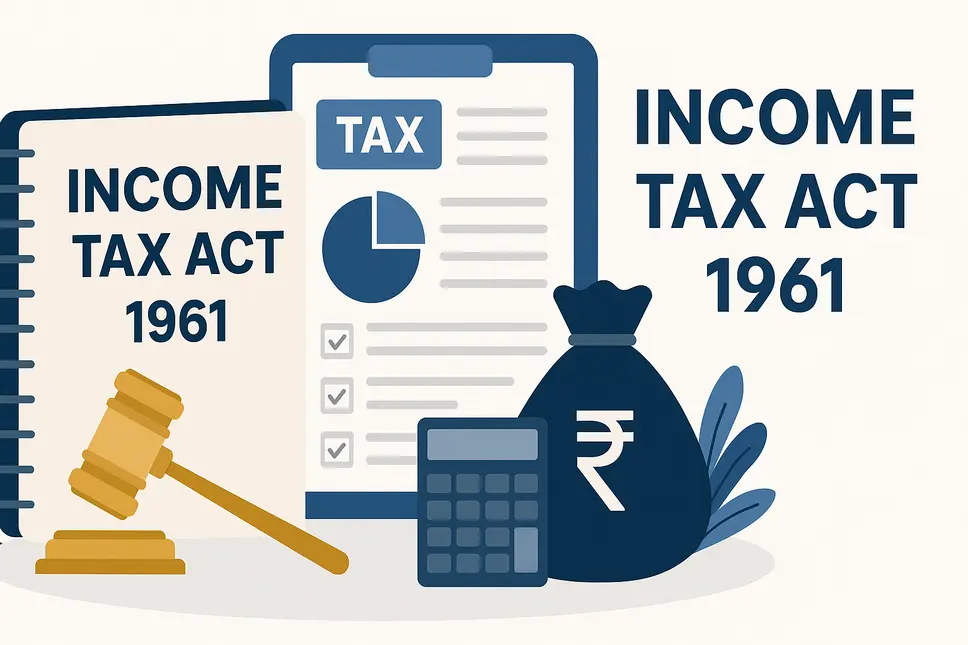The Income Tax Act 1961 is the apex of India’s tax law. The Act was passed in 1961 by the Government of India in 1961, this Act regulates how income tax is assessed, gathered and refunded for all types of taxpayers, be it businesses, individuals or LLPs. No matter if you’re a salaried or non-salaried employee or business owner as well as a non-resident Indian (NRI) having a clear understanding of the rules that are in the Act is crucial for accurate and legal tax filing.
This guide will cover all important features in The Income Tax Act, including its main sections, objectives and deductions, assessment processes and the forthcoming Income Tax Bill 2025.
What is the Income Tax 1961?
The Income Tax Act 1961 became effective on April 1st in 1962. It establishes the legal framework for taxation of income that is the entire income of a person in an entire fiscal year. The administration is handled through the Income Tax Department under the Central Board of Direct Taxes (CBDT) The Act comprises more than two hundred and eighty-eight sections which are organized in Chapters of 23.
It includes:
-
The income source
-
Tax liability based upon residency
-
Rates and tax slabs
-
Deductions (like Section 80C, 80D)
-
Capital gains
-
TDS (Tax Deducted at Source)
-
Penalties and the prosecution
-
Assessment and appeal procedures
Objectives of the Income Tax Act, 1961
The Act isn’t just an instrument for collecting revenue. It also serves wider goals in terms of social and economic:
-
Revenue Generating For financing the government’s expenditures, such as healthcare, infrastructure and education.
-
Distribution of Wealth Progressive taxation guarantees the highest earners pay more tax and reduce the gap in income.
-
Cost Stability In controlling spending through taxes or other fees, the government can control the rate of inflation.
-
full employment Tax incentives for companies can encourage hiring and lower unemployment.
-
Balance of Correction of Payments Tax policies may deter imports, and also encourage domestic industries.
-
Economic Growth encourages savings and investments through tax deductions and exemptions.
-
tax Compliance offers an unambiguous system of assessments, penalties, and appeals to ensure the truthfulness of declaring income.
Key Chapters and Sections of the Income Tax Act
This is a brief overview of a few crucial chapters and the topics they include:
| Chapter | Subject | Key Sections |
|---|---|---|
| I – III | Preliminary, Charge of Tax, Exemptions | 1 – 13B |
| IV | Computation of Total Income | 14 – 59 |
| VIA | Deductions (80C to 80U) | 80A – 80U |
| VII – VIII | Tax Authorities, Assessment Process | 116 – 158 |
| IX – X | The relief from double taxation The Anti-Avoidance Act | 90 – 94B |
| XII – XIIA | Special Provisions for NRIs, Companies | 110 – 115I |
| XIV – XX | Procedures, Appeals, Revisions | 139 – 264 |
| XXI – XXII | Penalties and Prosecutions | 270 – 280D |
There is a way to download the entire Income Tax Act 1961 PDF from the official Income Tax Department website for an in-depth read.
Important Provisions of the Income Tax Act
A few of the more useful and widely used options are:
-
Section 80C Deductions on investment such as PPF, ELSS, LIC (up to Rs1.5 lakh)
-
Section 80D deducts health insurance premiums
-
Section 80G Tax deductions for charitable contributions
-
Section 10 is a list of incomes that are exempted like gratuities, HRA or agricultural income
-
Section 24(b): Interest on deductions for home loans as income from the property of the house
-
Section 194 TDS on payment such as salaries, rent and professional fees
Professionals and business owners Consultation with an tax consultant as well as the best CA firm assures accuracy in filing and the maximum benefit from these rules.
Features of the Income Tax Act
Here are some of the notable characteristics:
-
Direct Tax Direct Tax: Payed directly by both entities and individuals.
-
applies Nationally It covers all the income source and status of residency.
-
Tax Slabs Progressive system which ensures the highest earners pay more.
-
Full coverage Business, salaries, property, capital gains and much more.
-
Updates frequently revised by Finance Acts every year.
-
Electronic Filing: e-Filing, eAssessment as well as digital TDS filing will ensure easy compliance.
Recent Update – Income Tax Bill 2025
The government has introduced an income tax Bill 2025 to modernize the current Act. The main highlights are:
-
Additional Sections from 298 to 536. Covering modern finance and digital assets.
-
Simple Drafting Reducing from 890 pages to 622 pages.
-
simplified language more accessible to tax professionals.
-
tax Year Concept replaces “Previous Year” and “Assessment Year” by “Tax Year.”
-
A stronger digital Integration Assessments without faces and improved e-governance tools.
-
Bitcoin Inclusion The Virtual Digital Assets like cryptocurrencies now are subject to tax surveillance.
The changes aim to increase compliance and make it easier to conduct business, while also reducing the risk of the risk of litigation.
Why You Should Consult a Tax Consultant or the Best CA Firm
Navigating the complex areas of Income Tax Act requires professional assistance. A qualified Tax Consultant helps you:
-
Learn about the deductions and exemptions that are applicable.
-
Complete tax returns for income that are accurate
-
Avoid tax notices or penalty
-
Improve tax planning strategies
Selecting the most reputable CA company will provide tax solutions that span from accounting to appeals and tax audits and support for litigation.
Conclusion
The Income Tax Act 1961 provides the basis of India’s tax system. It has changed over the years to keep pace with evolving economic conditions. With a thorough understanding of its sections, chapters and the most recent updates business and individual taxpayers are able to make informed tax-related choices, take advantage of legitimate deductions, and remain in compliance. If you’re a salaried worker or a business owner, knowing the law — or better getting an expert tax consultant as well as the best CA firm can result in better tax planning and savings over the long term.
Need help with filing your taxes?
Consult the Best CA Firm today to ensure you’re on the right financial path.




